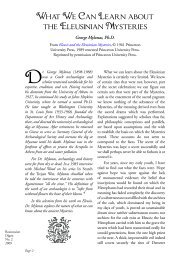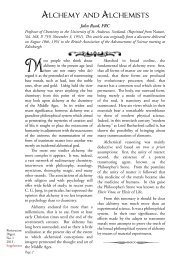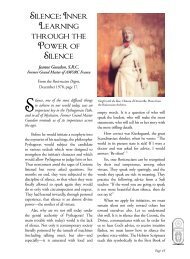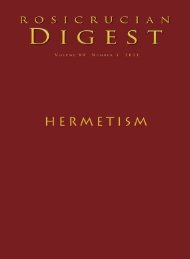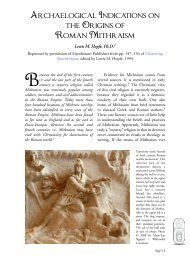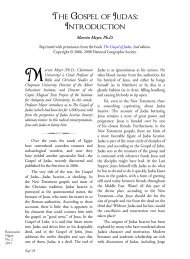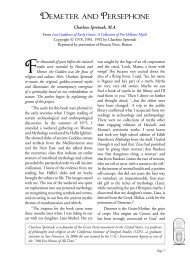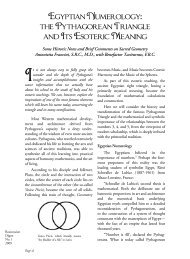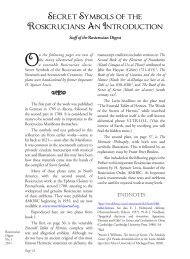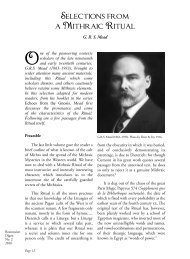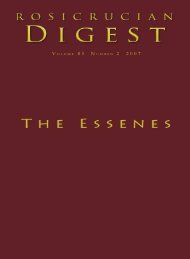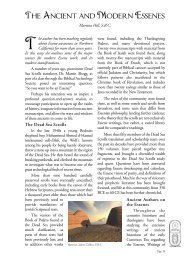Pythagorean Teachings across the Centuries - Rosicrucian Order
Pythagorean Teachings across the Centuries - Rosicrucian Order
Pythagorean Teachings across the Centuries - Rosicrucian Order
Create successful ePaper yourself
Turn your PDF publications into a flip-book with our unique Google optimized e-Paper software.
wrote of it to <strong>the</strong>ir friends, as if <strong>the</strong>y had<br />
gained some great advantage.<br />
“The people of Metapontum used to<br />
call his house <strong>the</strong> temple of Ceres; and <strong>the</strong><br />
street leading to it <strong>the</strong>y called <strong>the</strong> street of<br />
<strong>the</strong> Muses, as we are told by Favorinus in<br />
his Universal History. And <strong>the</strong> rest of <strong>the</strong><br />
<strong>Pythagorean</strong>s used to say, according to <strong>the</strong><br />
account given by Aristoxenus, in <strong>the</strong> tenth<br />
book of his Laws on Education, that his<br />
precepts ought not to be divulged to all<br />
<strong>the</strong> world....” 10<br />
Porphyry Followed <strong>the</strong> <strong>Pythagorean</strong> Life<br />
In this brief summary about <strong>the</strong><br />
evolution of <strong>the</strong> <strong>Pythagorean</strong> thinking,<br />
two important sources cannot be omitted:<br />
<strong>the</strong> writings of Porphyry and Iamblichus.<br />
Porphyry (ca. 233-ca. 309 CE), a Phoenician<br />
disciple of Plotinus, was a true follower of<br />
<strong>the</strong> <strong>Pythagorean</strong> teachings. Faithful to <strong>the</strong><br />
doctrine of <strong>the</strong> school, he believed that all<br />
life must be dedicated to <strong>the</strong> purification of<br />
<strong>the</strong> soul, to <strong>the</strong> control of <strong>the</strong> body, and to<br />
overcoming passions in order to merge with<br />
<strong>the</strong> Divine. In order to attain this elevation<br />
toward God, it is necessary to overcome<br />
<strong>the</strong> obstacles produced by <strong>the</strong> vibrations<br />
and impulses of matter. One must have<br />
determination to rid oneself of that “clothing<br />
that imprisons and obscures <strong>the</strong> soul.”<br />
In his work, On Abstaining from Using<br />
Animals as Food, Porphyry highlights<br />
Peter Paul Rubens, Pythagoras Advocating Vegetarianism<br />
(1618-20). Royal Collections of <strong>the</strong> United Kingdom.<br />
<strong>the</strong> advantages of a vegetarian diet. The<br />
interesting aspect is not so much what he tells<br />
us about <strong>the</strong> food, but <strong>the</strong> ethical concept<br />
of this practice—of this rule of life related<br />
to eating—from <strong>the</strong> <strong>Pythagorean</strong> point of<br />
view. He explains that <strong>the</strong> <strong>Pythagorean</strong> rule<br />
is not only healthy, but ra<strong>the</strong>r is a necessary<br />
instrument for <strong>the</strong> union with <strong>the</strong> Divine,<br />
which must be <strong>the</strong> goal of life for all human<br />
beings who are aware of <strong>the</strong>ir divine origin.<br />
In this work Porphyry discussed his<br />
<strong>the</strong>ory concerning sacrifices, considering<br />
<strong>the</strong>m as inferior acts of worship and<br />
only likely to invoke evil spirits. Only<br />
philosophers, understood as disciples of<br />
Pythagoras, avoid <strong>the</strong>se practices of low<br />
magic in order to consecrate <strong>the</strong>mselves<br />
to God, since <strong>the</strong>y are students of nature<br />
and understand her signs. Fur<strong>the</strong>r, <strong>the</strong>y are<br />
seen to be intelligent, modest, moderate,<br />
and always intent on raising <strong>the</strong>mselves to<br />
<strong>the</strong> Divine. 11<br />
Porphyry’s Life of Pythagoras<br />
His best known work is The Life of<br />
Pythagoras, in which Porphyry described <strong>the</strong><br />
school of Crotona as follows:<br />
“When he reached Italy, he stopped at<br />
Croton. His presence was that of a free man,<br />
tall, graceful in speech and in gesture, and in<br />
everything else. Dicaearchus relates that <strong>the</strong><br />
arrival of this great traveler, endowed with all<br />
<strong>the</strong> advantages of nature, and prosperously<br />
guided by fortune, produced on <strong>the</strong><br />
Crotonians so great an impression, that he<br />
won <strong>the</strong> esteem of <strong>the</strong> older magistrates by<br />
his many and excellent discourses. They<br />
ordered him to deliver exhortations to<br />
<strong>the</strong> young men, and <strong>the</strong>n to <strong>the</strong> boys who<br />
flocked out of <strong>the</strong> school to hear him, and<br />
<strong>the</strong>n to <strong>the</strong> women, who came toge<strong>the</strong>r for<br />
this purpose.<br />
“Through this he achieved great<br />
reputation, and he drew great audiences<br />
from <strong>the</strong> city, not only of men, but also<br />
Page xxix



